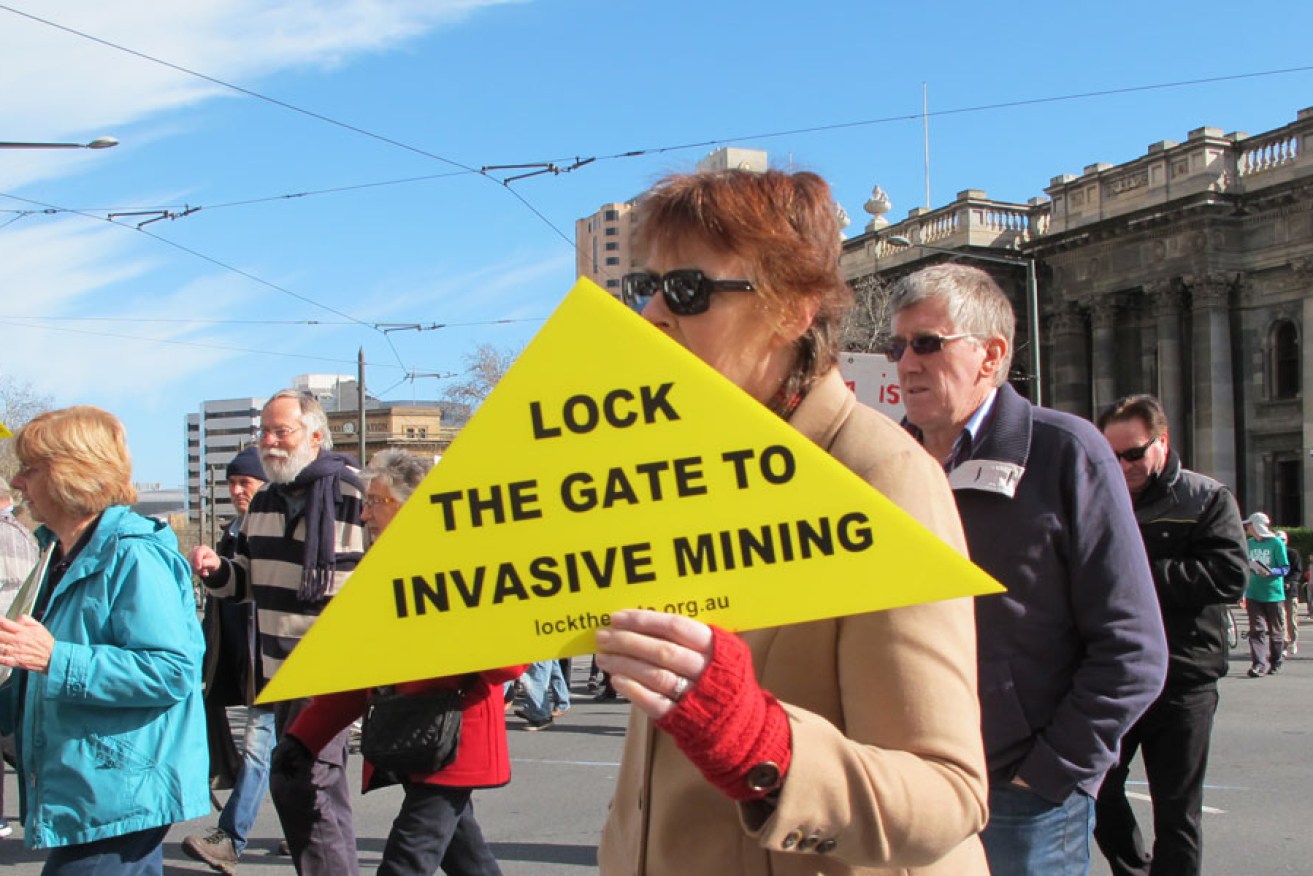“Green” Liberals under fire from business
The state’s peak business lobby has lamented the Liberal Opposition’s south-east fracking moratorium as a policy “more aligned with the Greens” than a party of business.

Environmental activists and landowners from the South East protest against fracking. AAP image
Liberal leader Steven Marshall yesterday pledged his Government, if elected, would place a 10-year ban on hydraulic fracturing of unconventional gas in the region, where the issue has been a hot-button issue in recent years.
The south-east has been an unhappy hunting ground for the Liberals in recent years, with the nominally conservative seat of Mt Gambier held by independents for 12 years until Troy Bell won it back in 2014.
“It makes no sense to put this highly productive region and South Australia’s enviable clean and green reputation at risk by opening up some of our best farming land to fracking,” Marshall said.
“Put simply, this is a decision with the next hundred years in mind, not just the next 10.”
But Business SA chief Nigel McBride argues it is more a decision with the next election in mind, agreeing with the Chamber of Mines and Energy that the move – which echoes anti-fracking measures from interstate Labor Governments – “sends the wrong message at a time we should be concerned about investors for what could be an unconventional gas boom, in the Cooper Basin, for example”.
“Australia internationally is getting a reputation for sovereign risk,” McBride told InDaily.
“The question is do we as a state want to create a perception of sovereign risk?”
He said the moratorium was an excessive move, given there’s no imminent suggestion of any fracking on prime agricultural land in the south-east.
“This is very much using a sledgehammer to crack a nut,” he said.
“We just don’t want to kill off opportunities… do we want to afford that risk when there’s no urgent threat to prime farmland?”
After a succession of Liberal stances in contrast to stated Business SA priorities, including a complete rejection of further debate on a proposed nuclear waste dump, McBride noted that these were “interesting days”.
“They’re in opposition, so it’s their job to stimulate debate, but given their [position] on nuclear, it’s interesting to see a Labor party pro-nuclear and pro-fracking… Stand up the party that knows what it’s standing for!
“The [Liberals] clearly haven’t spoken to me about what we believe and I doubt they’ve spoken to the chamber of mines about what they consider important… the Liberal Party has its own agenda, and its agenda is to be elected.”
He said Business SA would not endorse one side or other, insisting “we endorse policies not parties”.
“But obviously if there’s one party with substantially better overall policies for business, we’ll come out and say that,” he said.
Nonetheless, he argued that the group “continues to have issues with size of the public sector and the total impact of state taxation” so “we wouldn’t be in a position to endorse Labor as a pro-business Government”.
“But at the same time, it’s interesting days… in relation to the Liberal Party, this would be more aligned with a Greens position,” he said.
Bruce Holland, a spokesman for The Norwood Resource, a group of retired and semi-retired resource industry professionals formed to promote factual information about their industry, echoed McBride’s comments.
He said Marshall’s “knee-jerk” decision seemed to be based more on populism than evidence.
“He’s started to look more like the Greens that Labor normally does,” Holland says.
“Ironic? It’s confounding. I couldn’t believe it, to be honest.”
The Liberal moratorium announcement came after Parliament’s Natural Resources Committee handed down its report into unconventional gas extraction in the south-east.
While that report found there was no “social licence” for fracking in the region, Holland said it also concluded the risks of fracking in deep shale, which is the situation in the south-east, were not likely to be significant if the process was properly managed and regulated.
This reflected scientific opinion overseas and was the view of Australia’s chief scientist Alan Finkel.
He said the government and the industry needed to do more to present evidence about the safety of fracking to combat the “urban myths” that abounded in the south-east.
Holland, who works as a consultant in the electricity industry, said the decision could have negative impacts on power prices in the future.
“We need more gas (sourced locally) to drive our electricity prices down,” he said.
The moratorium has been welcomed by some groups in the south-east.
“The protection of South Australia’s food bowl should be a bipartisan issue,” said Merilyn Paxton, chair of the Limestone Coast Protection Alliance.
“The risks that industrial gas fields pose to our groundwater supplies and our existing agricultural and tourism businesses are just too great.”
– with AAP




